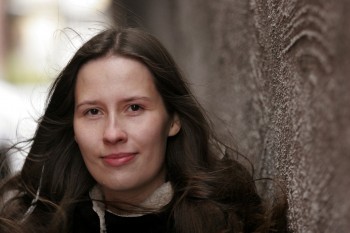Search results for "herbert lomas/www.booksfromfinland.fi/2004/09/no-need-to-go-anywhere"
Government Prize for Translation 2011
24 November 2011 | In the news
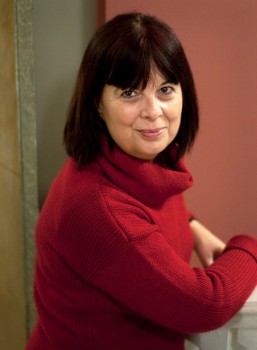
María Martzoúkou. Photo: Charlotta Boucht
The Finnish Government Prize for Translation of Finnish Literature of 2011 – worth € 10,000 – was awarded to the Greek translator and linguist María Martzoúkou.
Martzoúkou (born 1958), who lives in Athens, where she works for the Finnish Institute, has studied Finnish language and literature as well as ancient Greek at the Helsinki University, where she has also taught modern Greek. She was the first Greek translator to publish translations of the Finnish epic, the Kalevala: the first edition, containing ten runes, appeared in 1992, the second, containing ten more, in 2004.
‘Saarikoski was the beginning,’ she says; she became interested in modern Finnish poetry, in particular in the poems of Pentti Saarikoski (1937–1983). As Saarikoski also translated Greek literature into Finnish, Martzoúkou found herself doubly interested in his works.
Later she has translated poetry by, among others, Tua Forsström, Paavo Haavikko, Riina Katajavuori, Arto Melleri, Annukka Peura, Pentti Saaritsa, Kirsti Simonsuuri and Caj Westerberg.
Among the Finnish novelists Martzoúkou has translated are Mika Waltari (five novels; the sixth, Turms kuolematon, The Etruscan, is in the printing press), Väinö Linna (Tuntematon sotilas, The Unknown Soldier) and Sofi Oksanen (Puhdistus, Purge).
María Martzoúkou received her award in Helsinki on 22 November from the minister of culture and sports, Paavo Arhinmäki. Thanking Martzoúkou for the work she has done for Finnish fiction, he pointed out that The Finnish Institute in Athens will soon publish a book entitled Kreikka ja Suomen talvisota (‘Greece and the Finnish Winter War’), a study of the relations of Finland and Greece and the news of the Winter War (1939–1940) in the Greek press, and it contains articles by Martzoúkou.
The prize has been awarded – now for the 37th time – by the Ministry of Education and Culture since 1975 on the basis of a recommendation from FILI – Finnish Literature Exchange.
Markus Nummi: Karkkipäivä [Candy day]
26 November 2010 | Mini reviews, Reviews
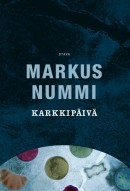 Karkkipäivä
Karkkipäivä
[Candy day]
Helsinki: Otava, 2010. 383 p.
ISBN 978-951-1-24574-2
€28, hardback
Like this one, Markus Nummi’s previous novel, Kiinalainen puutarha (‘Chinese garden’, 2004), set in Asia at the turn of the 20th century, involves a child’s perspective. Karkkipäivä‘s main theme, however, is a portrait of contemporary Finland. Tomi is a little boy whose alcoholic parents are incapable of looking after him; Mirja’s mother is a frantic workaholic heading for a nervous breakdown. She is a control freak who secretly gorges on chocolate at work and beats her little daughter – a grotesque portrait of contemporary womanhood. Tomi manages to get some adult attention and help from a writer; the relation between them gradually builds into one of trust. Katri is a social worker, empathetic but virtually helpless as part of the social services bureaucracy. Virtually every adult suspects others of lying, finding each other’s motives doubtful. Nummi (born 1959) has structured Karkkipäivä with great skill; the ending, in which matters are resolved almost by chance, is particularly gripping. This novel was nominated for the 2010 Finlandia Prize for Fiction.
Kari Hotakainen: Ihmisen osa [The human lot]
9 October 2009 | Mini reviews, Reviews
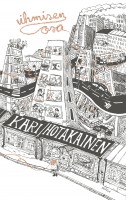 Ihmisen osa
Ihmisen osa
[The human lot]
Helsinki: Siltala, 2009. 276 p.
ISBN 978-952-234-021-4
30 €, hardback
Kari Hotakainen (born 1957) is one of Finland’s most internationally successful contemporary authors, and is widely known for his children’s books, plays and television screenplays. Like many of Hotakainen’s other works, Ihmisen osa is a contemporary novel, but it is one that sees the author being angrier and more ferocious than before; this is a story that will move readers and make them laugh. Its plot gets off to a slightly ungainly start: an impatient writer wants to ‘buy someone’s life’ for the purpose of turning it into material for a novel and is prepared to pay an elderly widow €7,000 for hers. A former yarn-seller tells him all about her life as she remembers it, and the writer writes it up into his own book – the husband’s wilful silence, a serious accident suffered by one of the three children, gradually being revealed. Having got the beginning out of the way, Hotakainen then puts his foot on the gas: in his laconic style he throws light on the conditions at the edges of contemporary working life: the business of selling images, selfishness and greed, the power of words. The yarn-seller writes to one of her children: ‘Don’t rise above your station. There’s no air up there, and you’ll get dizzy.’ Hotakainen’s novel Juoksuhaudantie (‘Trench Road’) was awarded the Finlandia Prize for Fiction in 2002. It has been translated into 17 languages and was awarded the Nordic Council’s Literature Prize in 2004.
Ulla Jokisalo & Anna Kortelainen
Pins and needles
11 May 2011 | Essays, Non-fiction
In these pictures by Ulla Jokisalo and texts by Anna Kortelainen, truths and mysteries concerning play are entwined with pictures painted with threads and needles. Jokisalo’s exhibition, ‘Leikin varjo / Guises of play’, runs at the Museum of Photography, Helsinki, from 17 August to 25 September.
Words and images from the book Leikin varjo / Guises of play (Aboa Vetus & Ars Nova and Musta Taide, 2011)
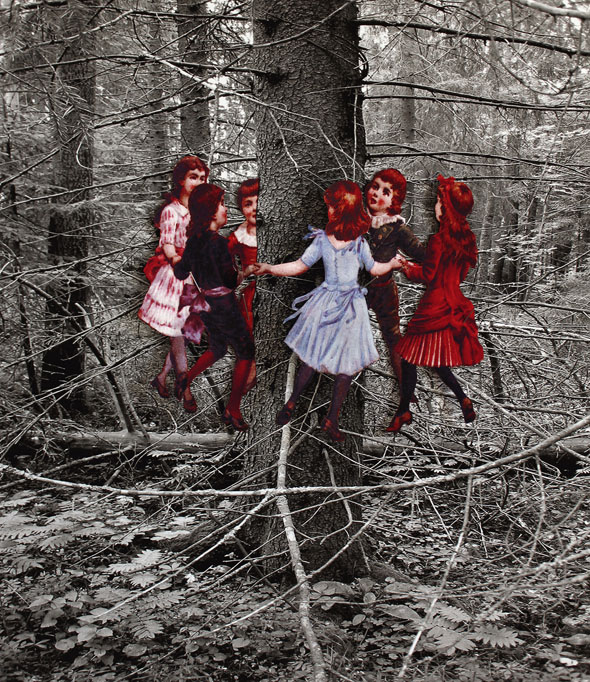
‘Ring dance’ by Ulla Jokisalo (pigment print and pins, 2009)
Martti Anhava: Romua rakkauden valtatiellä. Arto Mellerin elämä [Garbage on the highway of love. The life of Arto Melleri]
10 November 2011 | Mini reviews, Reviews
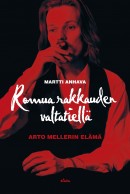 Romua rakkauden valtatiellä. Arto Mellerin elämä
Romua rakkauden valtatiellä. Arto Mellerin elämä
[Garbage on the highway of love. The life of Arto Melleri]
Helsinki: Otava, 2011. 687 p., ill.
ISBN 976-951-1-23700-6
€ 36, hardback
Arto Melleri (1956–2005) has been called the last Finnish bohemian poet. At the age of 35, he received the Finlandia Prize for a collection of poetry entitled Elävien kirjoissa (‘In the books of the living’) as well as an invitation to the Independence Day celebrations at the Presidential Palace, from which he was thrown out. The literary editor Martti Anhava traces his friend’s life from his schooldays in Ostrobothnia to his turbulent life in Helsinki. There are interviews with family members, friends, writers, musicians, theatre-makers; Melleri wound up studying dramaturgy at the Theatre Academy. The year 1978 saw the presentation of Melleri, Jukka Asikainen and Heikki Vuento’s play Nuorallatanssijan kuolema eli kuinka Pete Q sai siivet (‘The death of a tightrope walker or how Pete Q got wings’). Breaking completely with the mainstream political theatre of the 1970s, it became a cult show. The last volume by this poet of bold, often cruelly romantic visions was Arpinen rakkauden soturi (‘The scarred soldier of love’, 2004).
Translated by Hildi Hawkins
Paris 2
30 September 1987 | Archives online, Fiction, Prose
An extract from the novel Paholaispoika (‘The devil boy’, 1987). Introduction by Austin Flint
You must sit down, sayes Love, and taste my meat:
So I did sit and eat.
(George Herbert)
The city was the sum of the whole century, the capital of the eighteen hundreds, of no particular country. Like millions of others, I passed time reading the newspapers and keeping up with what was happening in Europe. Acorns would get crushed. There were many omens of how everything would turn out.
There were still a few remnants of the World’s Fair over by the Palais Royal. Not very many. The latest and most shocking incident was that the Lipschitz sculpture, ‘Prometheus Strangling the Vulture’, had been chopped to bits. Then it was put into storage, in some secret place. Crumbling rough grey stone that gave no idea of its shape. Rumour had it that the statue had offended official policy, and all sorts of things were certainly in the air. There was no longer any sign of the sculpture near the Palais Royal. More…
The miracle of the rose
30 June 1997 | Archives online, Fiction, Prose
Extracts from the novel Naurava neitsyt (‘The laughing virgin’, WSOY, 1996). The narrator in this first novel by Irja Rane is an elderly headmaster and clergyman in 1930s Germany. In his letters to his son, Mr Klein contemplates the present state of the world, hardly recovered from the previous war, his own incapacity for true intimacy – and tells his son the story of the laughing virgin, a legend he saw come alive. Naurava neitsyt won the Finlandia Prize for Fiction in 1996
28 August
My dear boy,
I received your letter yesterday at dinner. Let me just say that I was delighted to see it! For as I went to table I was not in the conciliatory frame of mind that is suitable in sitting down to enjoy the gifts of God. I was still fretting when Mademoiselle put her head through the serving hatch and said:
‘There is a letter for you, sir.’
‘Have I not said that I must not be disturbed,’ I growled. I was surprised myself at the abruptness of my voice.
‘By your leave, it is from Berlin,’ said Mademoiselle. ‘Perhaps it is from the young gentleman.’
‘Bring it here,’ I said. More…
Mirdja
31 March 1984 | Archives online, Fiction, Prose
An extract from the novel Mirdja (1908). Introduction by Marja-Liisa Nevala
Now they were in the city – their minds more alive than usual with wilfulness and daring.
For – quite unable to jettison their shared life – they had at least to get on top it… Had to … Every single person has to battle …
And Mirdja’s head was full of efficacious rules for balance, countless cool and wise thoughts – to meet all conflicts.
Lucidly and coldly she had clarified her present position for herself. She was married. Right. No particular joy in that. But no need for any particular disaster in it either. And if she had thrown herself into dependence through this banal arrangement, the sort that everyone has a little of in this life, she had only herself to blame. She had to be able to live by rising above the trivialities of existence. Besides, she had always known that in the final count it was immaterial whom one was married to. A marriage always had its own profile, its dreary distinguishing marks, but one was not compelled to absorb these dreary sides into one’s own being. How did they do it in France? Every year thousands of marriages occur, without an atom of personal liking entering into the game, and extremely seldom are the marriages unhappy. Why so? Mutual politesse: a little of the art of social intercourse, and the whole problem is solved. In the morning a tiny friendly greeting at the breakfast table: ‘Bonjour ma chère,’ – ‘Bonjour, mon ami’; a courteous kiss on the hand, a pretty smile in response, and everything’s as it should be. Because those people know how to go about it. Marriage – one of society’s many empty regimentations! Only stupid people tried, within narrow limits like these, to find fullness of content or idealize. Stupid, Mirdja had been. Comically destructive in that heavy northern solemnity of hers – refusing to acknowledge any form without content, yet fearful of endowing content with any form except the conventional and time-tested. She had lived with a common-or-garden person’s longing for fullness, and then allowed, exactly like that sort of person, her disappointment and bitterness to flood over all her nearest and dearest. She had lived in indiscretion. She had been paltry and rotten and considered herself a slave … More…
Is this all?
10 October 2013 | Extracts, Non-fiction
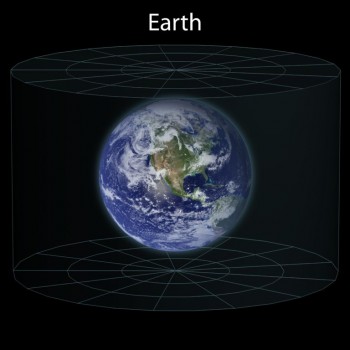
Earth. Andrew Z. Colvin/Wikimedia
In today’s world, many people find that it is not the lack of something that is problematic, but excess: the same goes for knowledge. According to professor of space astronomy, Esko Valtaoja, knowledge should contribute to the creation of a better world. His latest book is a contribution to the sum of all knowledge; over the course of two hundred pages Valtaoja delves deep into the inner space of man by taking his reader on a brief tour of the universe. Extracts from Kaiken käsikirja. Mitä jokaisen tulisi tietää (‘A handbook to everything. What everybody should know’, Ursa, 2012)
Whatever god you bow down to, you’re probably worshipping the wrong god.
The above is almost the only completely certain thing that can be said about religion, and even it does not encompass any deep truth; it’s just a simple mathematical statement. The world’s biggest religion is Roman Catholicism, which is confessed, at least nominally, by 1.1 billion people. If the Roman Catholic god were the true god, the majority of people in the world are therefore worshipping a false god. (According to the official stance of the Catholic church, the other Christian denominations are heresies, and their believers will be condemned to perdition: extra ecclesiam nulla salus. This inconvenient truth is, understandably, politely bypassed in ecumenical debate. But even if all those who call themselves Christians were counted as worshipping the same god, two thirds of the world’s population are still knocking at the wrong door.)
If you’re a religious person, don’t worry; I’m not blaspheming. And if you’re a campaigning atheist, hang on a minute: all I want to do is to find a clear and undisputed starting point to consider what it is we’re talking about when we speak of religion. More…
The way to heaven
30 June 1996 | Archives online, Fiction
Extracts from the novel Pyhiesi yhteyteen (‘Numbered among your saints’, WSOY, 1995). Interview with Jari Tervo by Jari Tervo
The wind sighs. The sound comes about when a cloud drives through a tree. I hear birds, as a young girl I could identify the species from the song; now I can no longer see them properly, and hear only distant song. Whether sparrow, titmouse or lark. Exact names, too, tend to disappear. Sometimes, in the old people’s home, I find myself staring at my food, what it is served on, and can’t get the name into my head. The sun came to my grandson’s funeral. It rose from the grave into which my little Marzipan will be lowered. I don’t remember what the weather did when my husband was buried.
A plate. Food is served on a plate. There are deep plates and shallow plates; soups are ladled into the deep ones. More…

